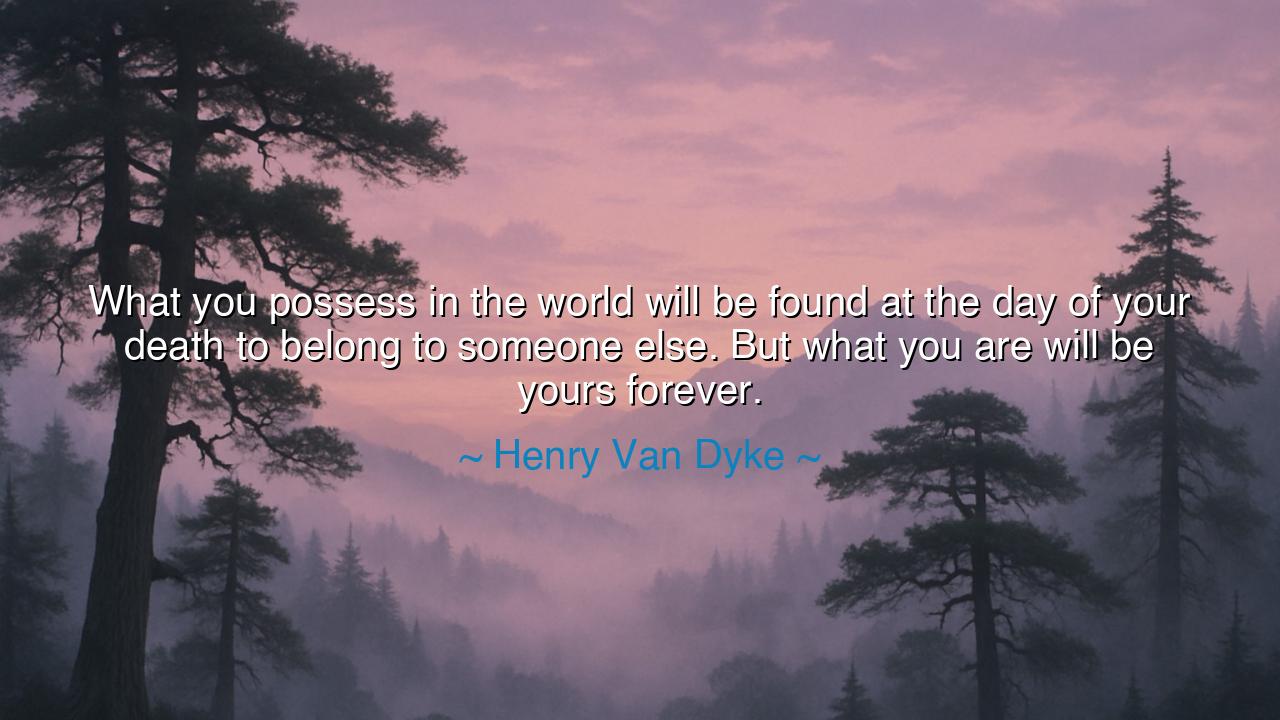
What you possess in the world will be found at the day of your
What you possess in the world will be found at the day of your death to belong to someone else. But what you are will be yours forever.






“What you possess in the world will be found at the day of your death to belong to someone else. But what you are will be yours forever.” Thus spoke Henry Van Dyke, a man of faith and reflection, who understood the eternal contrast between possession and being. In this sentence, as simple as it is profound, he exposes one of the oldest illusions of humankind—that wealth, power, and material gain can grant meaning or permanence. Against this illusion he sets a truth as enduring as time itself: that character, not possessions, is the only treasure that death cannot touch.
To the ear of the wise, these words ring like the echo of ancient philosophy. The Stoics of old—Epictetus, Marcus Aurelius, and their kin—taught that the only true good lies within the soul. They too reminded mankind that gold tarnishes, kingdoms crumble, and the body returns to dust. Yet the virtues of the spirit—honor, compassion, wisdom, integrity—these remain untouched by the grave. Van Dyke, writing centuries later, clothed this ancient truth in the gentle rhythm of Christian humanism, but the heart of his teaching is eternal: all that we own will one day be taken from us, but all that we are will endure beyond the shadow of death.
Consider the fate of the mighty Alexander the Great. He conquered the known world before his thirtieth year, gathered vast riches, and was saluted as a god among men. Yet when death came for him, he lay upon his deathbed powerless to command even his next breath. It is said that he ordered his hands to be left outside his coffin, so that the world might see they were empty—that though he had once held empires, he could take nothing with him. His possessions passed to others; his being, however—his courage, his vision, his indomitable will—became immortal, remembered not in gold or marble, but in the spirit of human ambition itself.
Such is the lesson of Van Dyke’s words. We spend our days in pursuit of possessions, forgetting they are only borrowed. The house we build will one day shelter strangers. The wealth we store will be counted in another’s name. Even our bodies, which we nourish and adorn, will return to the earth from which they came. Yet there is one thing that cannot be inherited, one thing that remains truly and eternally ours: the soul, fashioned by our choices, strengthened by virtue, and illuminated by love. It is the unseen self that walks beside us through every trial and follows us beyond the horizon of death.
To live wisely, then, is to build the self, not the storeroom. Each act of kindness, each moment of courage, each truth spoken in the face of deceit—these are the bricks of an invisible temple that no time can erode. The riches of the spirit do not glitter in sunlight, but they shine in eternity. The man who tends to his soul will find that even in poverty, he owns more than kings; while the one who lives for possessions may find that even in wealth, he is poor. Van Dyke calls us to turn inward, to nurture that which endures, rather than clutch that which fades.
Look to the life of Mother Teresa, who possessed almost nothing but left behind a legacy that no treasure could purchase. Her garments were simple, her dwelling humble, yet her being—her compassion, her service, her unshakable faith—became the inheritance of millions. Death could not strip her of what she had built within. Her body perished, but her spirit became immortal, woven into the memory of human goodness. This is the power of the soul that has chosen being over having—it transcends the grave and lives on in the hearts it has touched.
So, my friends, take heed. What you possess will one day belong to others, but what you are will follow you into the eternity that awaits beyond the veil. Cultivate not your fortune, but your virtue; seek not abundance in things, but abundance in spirit. Give freely, love deeply, speak truthfully, and act nobly, for these are the deeds that shape the soul into something death cannot claim.
In the end, the earth will reclaim your gold, your house, your titles, your name—but it cannot reclaim your light. Van Dyke’s words are a reminder that mortality does not diminish us if we live for what is immortal within. Let your life be your masterpiece, not your possessions. For when the day of death arrives, it will strip away all that you have, but it will reveal at last all that you truly are—and that, eternal and unbroken, will be yours forever.






AAdministratorAdministrator
Welcome, honored guests. Please leave a comment, we will respond soon